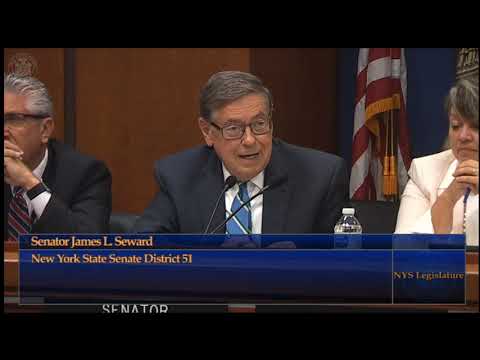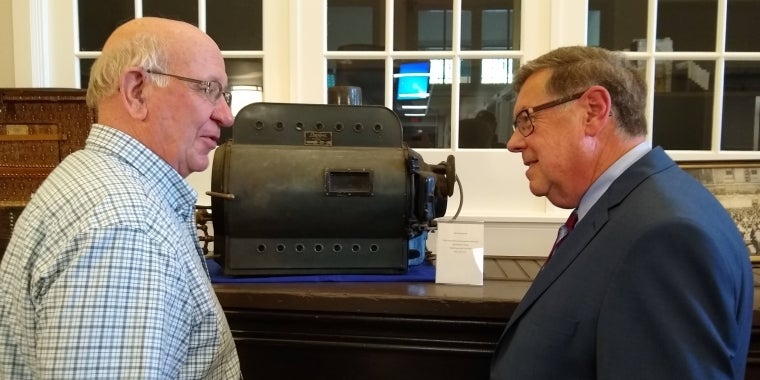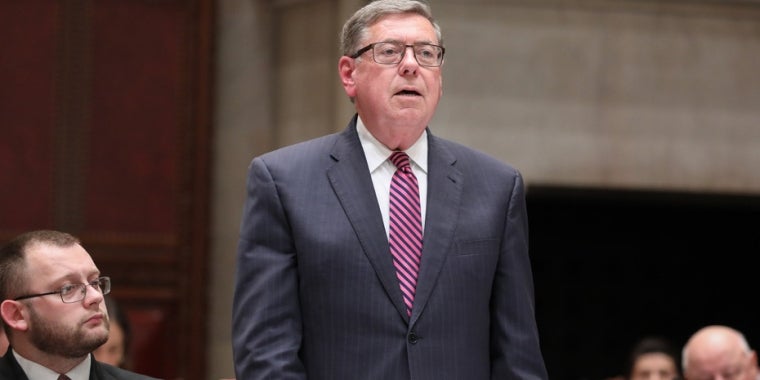
Senate Announces Legislative Reforms
Senator James L. Seward and Senate Majority Leader Joseph L. Bruno today announced a list of 17 Senate rule changes and other reforms that will be acted on when the Senate officially begins the 2005 session on Monday, January 10th. The rules reforms, which were recommended by the Senate Majority Task Force on Government Reform, will make the legislative process more open, effective and responsive and will help restore public confidence in state government, Seward said today.
"Last year, I established the Senate Majority Task Force on Government Reform and gave it a mission to review and seek input on how we can update and improve the legislative process, and also to take a look at other areas of state government that can be changed to increase responsiveness and accountability," Senator Bruno said. "The panel moved on a fast track, met half a dozen times to review every reform proposal that has been advanced, discussed them with the Majority Conference and now we are ready to move forward Monday and change the Senate’s rules. I thank the members of the task force, particularly the co-chairs, Senators Padavan and Volker, for making substantive recommendations for reform and doing it an in expedited manner so the changes can be implemented for the 2005 legislative session.
"It’s important to point out that these reforms are the first step, not the last, in our overall government reform effort," Senator Seward said. "The Senate will continue to work diligently towards other important issues, including budget reform, procurement lobbying, making public authorities more accountable and other ways to improve state and local governments. I look forward to working with the governor and the speaker on further government reforms."
"Just a few weeks ago we indicated that reforming the Legislative process would be a main priority of the Senate when we got back to Albany in 2005," Senator Padavan said. "Here we are in the first week of the new year, and we're ready to move forward with procedural changes. We again will be addressing budget reform in the near future. I'm pleased that the Assembly is putting forth its plan and that the governor seemed to focus on reforming several areas of government in his State of the State speech this week. I think 2005 will be the year we actually move forward on many of the 'reforms' we've all been discussing."
"The need for our citizens to trust our democratic form of government is crucial and essential," Senator Dale M. Volker (R-C-I, DePew), said. "The rule changes recommended by the task force will be accomplished in a bipartisan, fair, and equitable way and will help achieve an open and effective legislative process that is critical to maintaining citizens’ trust and support for our democratic system of government."
The Senate rule changes that will be taken up on Monday include the following:
> Reduce the number of committee assignments by 20 percent;
> Allow standing committee chairmen to make their own determinations with regard to committee personnel decisions;
> Allow any committee member to convene a public forum;
> Each reported bill shall be accompanied by a report;
> Limit the Rules Committee’s ability to move legislation to the floor;
> Increase number of committee hearings;
> Strengthening requirements for committee votes;
> Expand the window for committee action on bills;
> Use the Rules Committee to expedite action on future Rules changes;
> Concentrate similar bills on committee agendas;
> Encourage expanded use of joint conference committees on the budget and other legislation;
> Expand opportunities to petition bills from committee and to require expanded notification when bills are amended on the floor;
> Require members to be in their seats to vote "no;"
> Eliminate party line voting;
> Expanded time for floor debate;
> Eliminate majority leader’s "star;"
> Expedited local bill and home rule process; and
> Additional information required for messages of necessity.
Senator Bruno also announced that the Senate will undertake a review of electronic voting in an effort to implement new restrictions on "empty seat" voting. Unlike the Assembly, the Senate does not utilize electronic voting to record individual votes. The existing Senate rule requires the consent of five members to require a slow roll call vote on any bill before the Senate. The Senate will pursue a review of electronic voting as a means to eliminate empty seat voting, as well as the use of new technology to improve the efficiency and operation of the Senate.
Senator Bruno has established a strong record of reform since being elected majority leader in 1995. He has initiated such reforms as: issuing public legislative expenditure reports twice a year that detail legislative spending; establishing the use of legislative conference committees to negotiate differences between similar bills passed by both houses; making live audio and video of Senate sessions available on the Senate Internet web site and on cable television; giving more responsibility for legislation and policy development to individual committee chairs; and making the Senate run in a more timely and businesslike fashion.
When he became majority leader, Senator Bruno reduced the number of newsletters available to each Senator; closed 20 Senate offices; restricted Senate travel; reduced the size of the Senate staff by twenty percent; eliminated several legislative commissions and has kept the Senate’s budget far below the rate of inflation. The Senate has also lead efforts on budget and Medicaid reform.
####



